In today’s data-driven world, organizations need to track and optimize their energy consumption to cut costs, reduce environmental impact, and meet sustainability goals. One of the most effective ways to achieve this is through an Energy Efficiency KPI Dashboard in Excel. This dashboard provides a visual and interactive way to monitor energy performance using Key Performance Indicators (KPIs). Whether you’re managing a factory, office, or large facility, this tool can transform raw data into valuable insights.
In this article, we will walk you through every aspect of the Energy Efficiency KPI Dashboard, including its key features, benefits, best practices, and frequently asked questions. Let’s get started!
Click to Purchase Energy Efficiency KPI Dashboard
What is an Energy Efficiency KPI Dashboard in Excel?
An Energy Efficiency KPI Dashboard in Excel is a spreadsheet-based tool that helps you track key metrics related to energy usage. It displays important indicators like energy consumption, cost, efficiency ratios, and performance trends in a user-friendly format.
Excel dashboards are easy to use, customizable, and highly flexible. That makes them ideal for both small and large businesses.
Why Should You Use an Energy Efficiency Dashboard?
- You should use an energy efficiency dashboard because it:
- Helps monitor real-time energy consumption
- Compares actual vs. target values easily
- Shows performance over time using trend charts
- Reduces manual reporting time and errors
- Most importantly, it supports better decision-making with data insights at your fingertips.
Key Features of the Energy Efficiency KPI Dashboard
This ready-to-use Excel dashboard includes 7 interactive worksheet tabs:
Home Sheet
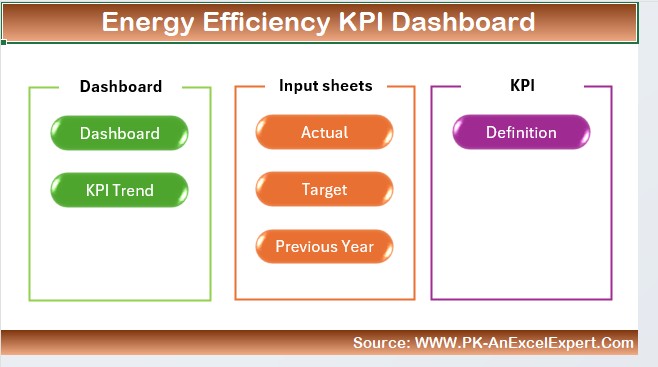
- Works as an index page
- Includes six clickable buttons for easy navigation to each sheet
Dashboard Sheet
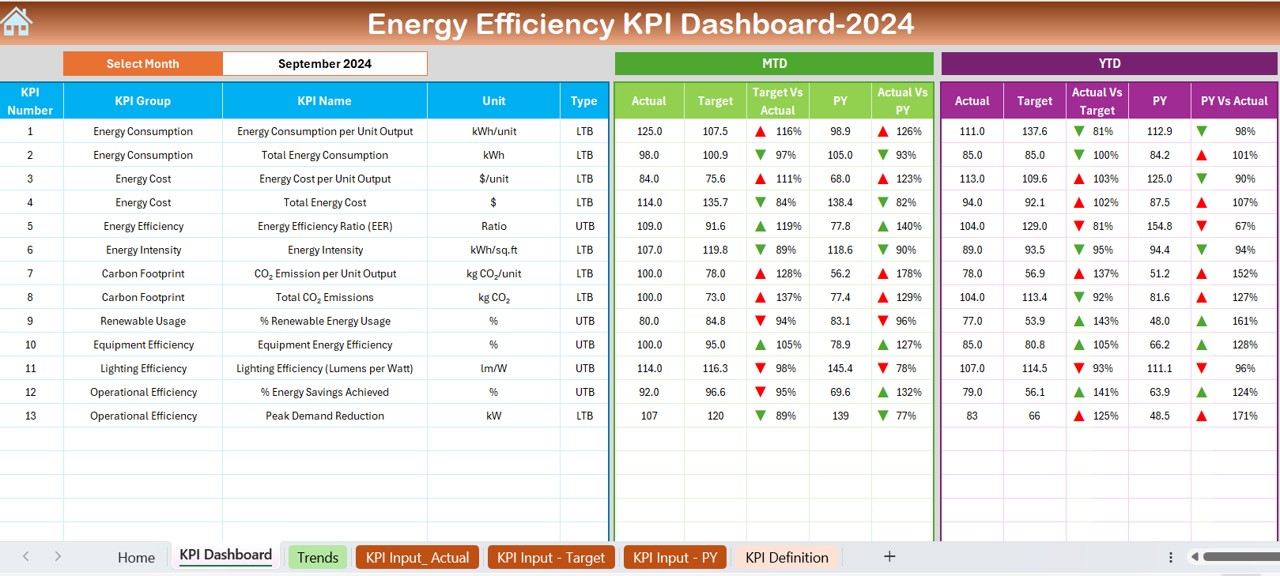
- Main summary page
- Use dropdown in cell D3 to select the month
- Automatically updates MTD (Month to Date) and YTD (Year to Date) values
- Displays Actual, Target, and Previous Year values
- Uses up/down arrows with conditional formatting to indicate performance
KPI Trend Sheet
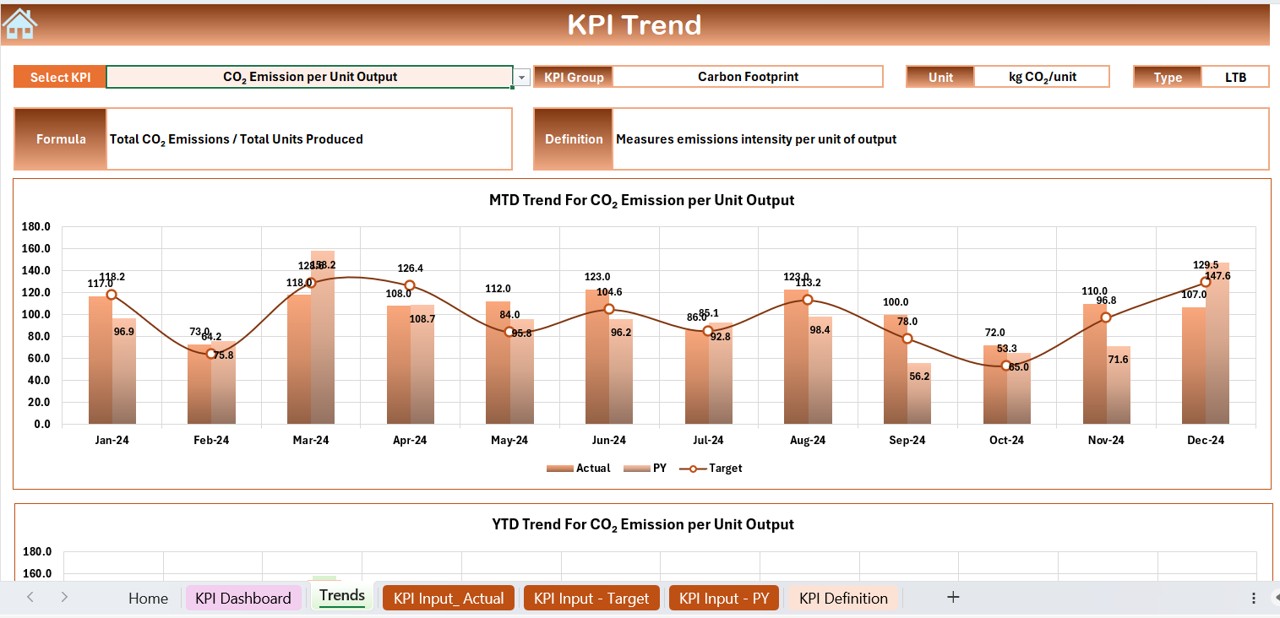
- Select KPI from dropdown in cell C3
- Shows KPI Group, Unit, Type (Lower/Upper is Better), Formula, and Definition
- Includes MTD and YTD trend charts for Actual, Target, and Previous Year
Actual Numbers Input Sheet
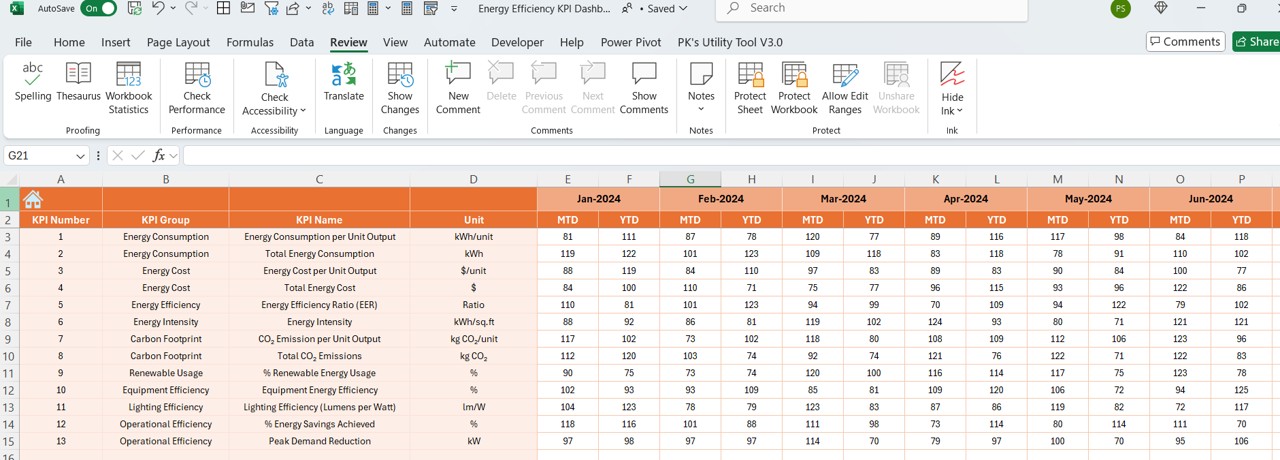
- Input MTD and YTD data manually
- Change the month in cell E1 to enter values for any specific month
Click to Purchase Energy Efficiency KPI Dashboard
Target Sheet
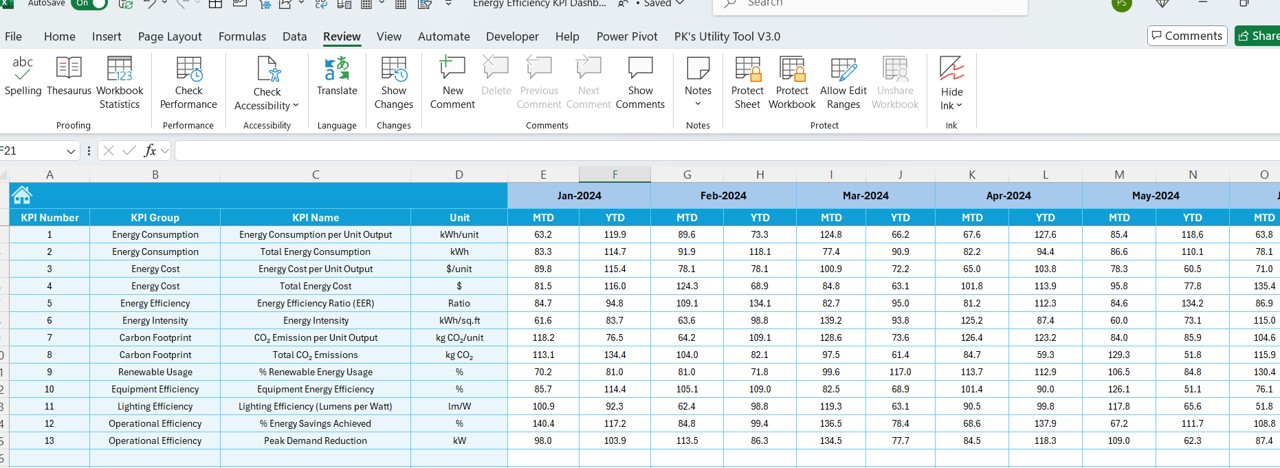
- Input monthly target values for each KPI
- Tracks both MTD and YTD targets
Previous Year Number Sheet
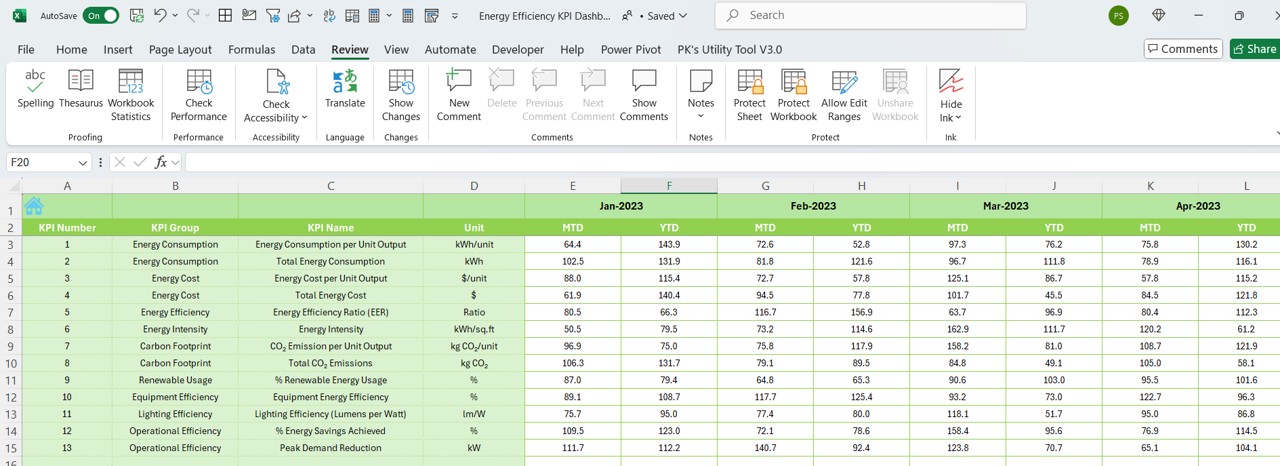
- Record the same KPIs for the previous year
- Helps in comparing year-on-year performance
KPI Definition Sheet
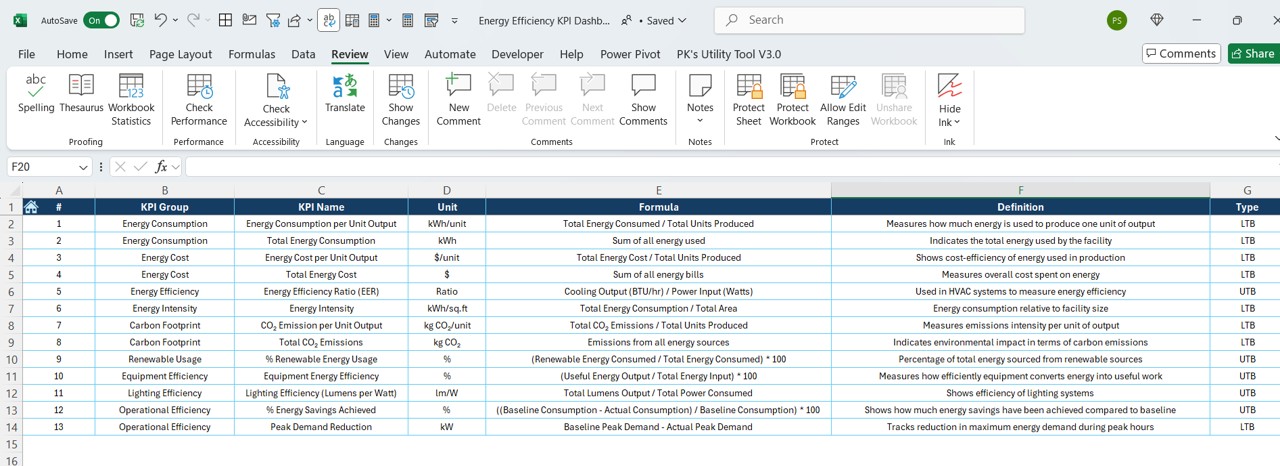
- Enter KPI name, group, unit, formula, and full definition
- Acts as a reference for users unfamiliar with KPI terms
Advantages of Using an Energy Efficiency KPI Dashboard in Excel
Using this dashboard offers several practical benefits:
✅ Easy to Use: No need for advanced software or coding skills
✅ Customizable: Add or remove KPIs based on your specific needs
✅ Visual Performance Tracking: Graphs and arrows make interpretation faster
✅ Time-Saving: Reduces time spent on manual calculations and reporting
✅ Data-Driven Decisions: Real-time updates help in proactive management
Best Practices for the Energy Efficiency KPI Dashboard
To get the most out of your dashboard, follow these tips:
- Keep KPI definitions clear and consistent
- Update actual numbers regularly (ideally monthly)
- Validate data for accuracy before uploading
- Avoid too many KPIs – focus on 8 to 10 essential ones
- Use color coding and arrows for quick visual cues
- Back up your data periodically
- Train users so everyone knows how to use the dashboard effectively
How to Set Up the Dashboard for Your Organization
Here’s how you can implement the dashboard smoothly:
List All Relevant KPIs:
- Energy Usage per Unit
- Energy Cost per Square Foot
- Efficiency Ratios
- Renewable Energy Share
Customize the KPI Definition Sheet:
- Define each metric
- Assign a formula
- Mention whether “lower” or “higher” is better
Input Historical Data:
- Fill in Actual, Target, and Previous Year numbers
Test Your Formulas:
- Check for errors in calculated values
- Ensure dropdowns and charts are working correctly
Share the Dashboard with Stakeholders:
- Present monthly or quarterly performance
- Discuss gaps and opportunities
Most Useful KPIs for Energy Efficiency
If you’re wondering which KPIs you should include, here are some of the most important ones:
- Energy Consumption per Unit of Output
- Cost per Kilowatt-Hour (kWh)
- Energy Cost per Square Foot
- Carbon Emissions per Unit of Output
- Percentage of Renewable Energy Used
- MTD & YTD Actual vs. Target Ratios
Common Mistakes to Avoid
Click to Purchase Energy Efficiency KPI Dashboard
- When working with KPI dashboards, try to avoid these pitfalls:
- Using inconsistent units of measurement
- Forgetting to update previous year data
- Ignoring YTD trends in favor of MTD only
- Not validating formulas before sharing reports
- Overloading the dashboard with too much information
How This Dashboard Supports Sustainability Goals
- The Energy Efficiency KPI Dashboard does more than track numbers. It actively supports your green goals by:
- Highlighting areas of high energy waste
- Encouraging responsible energy usage
- Supporting energy audits with data
- Enabling performance benchmarking across departments
- Helping achieve ESG (Environmental, Social, Governance) compliance
Conclusion
An Energy Efficiency KPI Dashboard in Excel is an essential tool for any organization that wants to monitor energy usage, improve operational efficiency, and meet sustainability goals. With just a few clicks, you can turn raw data into meaningful insights, drive cost savings, and support your organization’s commitment to going green.
Using this dashboard isn’t just smart—it’s the future of efficient operations.
🔹 Frequently Asked Questions (FAQs)
Q1. What are Energy Efficiency KPIs?
Answer: These are performance indicators that help measure how effectively your organization uses energy. Common examples include energy consumption per unit and energy cost per square foot.
Q2. Can I use this Excel dashboard without advanced Excel skills?
Answer: Yes! This dashboard is designed for ease of use. Dropdowns, charts, and color-coded arrows make it intuitive for anyone.
Q3. Is it possible to customize the KPIs?
Answer: Absolutely. You can add, edit, or remove KPIs in the KPI Definition sheet and the dashboard will adjust accordingly.
Q4. How often should I update the dashboard?
Answer: Ideally, update it monthly with the latest MTD and YTD actual numbers. This ensures your reports stay current.
Q5. Can I use this dashboard for non-industrial settings like offices or schools?
Answer: Yes, this dashboard works for any organization that tracks energy usage and wants to improve efficiency.
Click to Purchase Energy Efficiency KPI Dashboard
Visit our YouTube channel to learn step-by-step video tutorials



